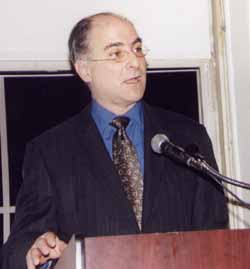Former Schools Chancellor Levy Speaks at Columbia
Former New York City Schools Chancellor Harold Levy spoke at Columbia University on February 6th on the topic, "Social Responsibilities: The Challenges of Urban Public Education."
Levy spoke as part of a series for First-Year Scholars at Columbia, undergraduate recipients of C.P. Davis, Global, John Jay, and Kluge scholarships. Teachers College co-sponsored the talk and Teachers College students seemed to outnumber Columbia undergraduates in the audience. Levy spoke about his experiences as Schools Chancellor and what he sees as the underlying problems facing urban education.
Lavinia Lorch, Assistant Dean of Student Affairs, introduced Levy saying, "Harold Levy was chosen because he's a real person." Levy is himself a product of the New York City public schools; he attended P.S. 189, Junior High School 52, and Bronx Science High School. Prior to becoming Chancellor, Levy was Citigroup's Director of Global Compliance, and served on the New York State Board of Regents. He is currently writing a book.
Levy began by relating some stories from his tenure as Chancellor. As Chancellor, Levy had 1.1 million school children in his charge, along with 80,000 teachers and roughly 120,000 employees. Levy said, "the tools you're given as a chancellor, as a head of a school system, bear very little resemblance to the tools you need. You're given these mechanical, structural things, and what you really need is a podium, and a checkbook. I was given one out of two." Levy also spoke of the difficulty of battling a powerful mayor who was dead set against his appointment as Chancellor.
While Levy mentioned the administrative challenges of being Chancellor, he also spoke of the emotional challenges. He had to meet, all too often, with the parents of injured children, and children who died. He remembered one incident where he met the mother of a young child who was run over by a bus while walking to school. "There is nothing in the vocabulary that equips you to be of assistance at that point in time. I am not religious enough, I do not know enough poetry, I do not have enough of a soul or spirit to do the job. And yet, you do it. And the mere fact that somebody with the august title of Chancellor is there to pay recognition, to pay homage, to pause, was obviously of great significance to this woman. And I learned, that the power of the office, at least in part, is the symbolism."
Levy also addressed the fundamental question, how do you make public education work? As a chancellor, Levy looked carefully at the statistics on student achievement. He found that factors outside of school-such as poverty, limited English proficiency, and recent immigrant status-had the greatest effect on student achievement. "Even if I get everything right, I could only impact reading scores marginally…If we think about public education improvement as entailing only school reform, we will only get marginal success. It goes beyond the school." Levy then looked at what he could do to affect the little bit that was in his control. He found that a few things had the greatest effect on student scores: teacher quality, time on task, and attendance.
Levy went on to say, "the ultimate power of a schools chancellor…is this, pick your issues…The ultimate issue of America is race." He argued that family has the greatest effect on children's success in school. Quoting the work of Larry Sternberg of Temple University, Levy said that parent expectations and the number of hours children spend outside of school working on schoolwork have the greatest effect on children's test scores. The larger question, Levy said, is how to address the issue of socioeconomic inequality that affects schools more than anything else. "We don't have the tools we need to make public education work because we're scared of the ultimate issue. The ultimate issue is one of figuring out how we make the non-school part of education work. That is a critical issue."
Levy ended the evening by taking questions from the audience, and stayed after his lecture to continue informal discussions.
Published Monday, Mar. 3, 2003
